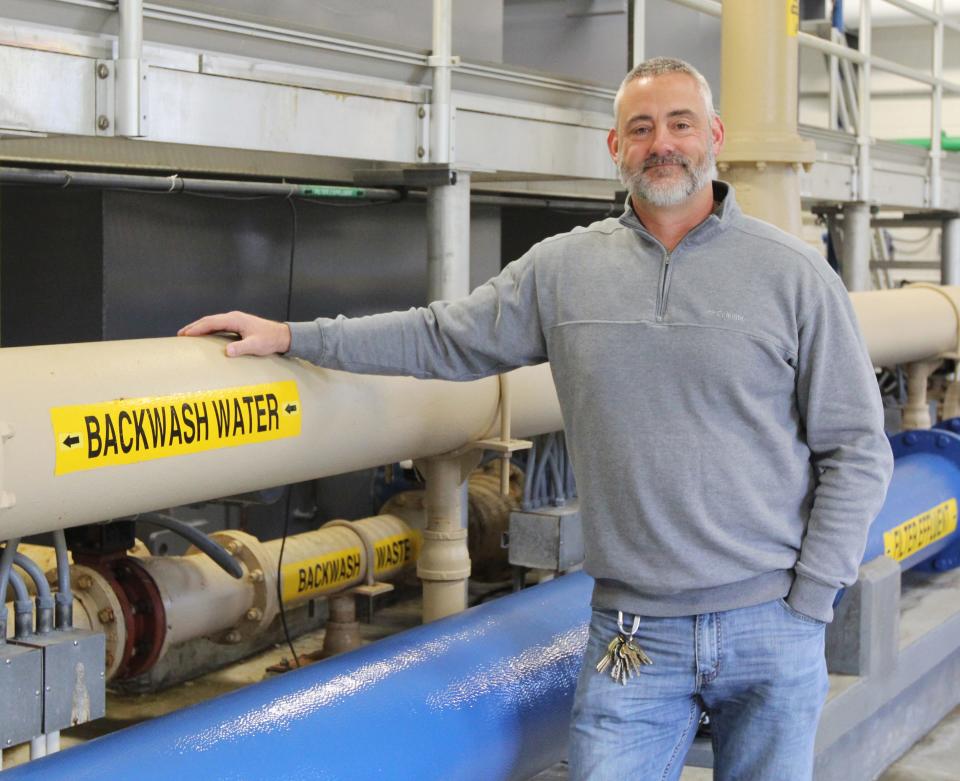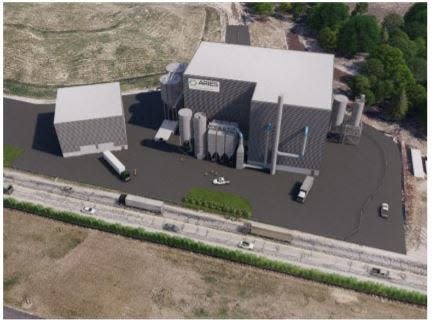Reducing waste through bacterial digestion? Taunton officials contemplating new ideas
TAUNTON – What new ideas does the city have for waste management?
How about anaerobic digestion?
City Council’s Committee on Solid Waste engaged in an informal discussion on Dec. 5 about the prospect of employing this organic method for decomposition in Taunton.
Expert testimonial came from representatives from Veolia who manages Taunton’s wastewater treatment plant.
What is anaerobic digestion?
The process utilizes bacteria to break down or digest organic matter, such as food wastes, animal manure, greases, and biosolids from wastewater. It’s typically done in enclosed and heated tanks or vessels, with the absence of oxygen.
The end products produced are biogas, primarily composed of methane, which can be used as an energy source, and digestate, the remaining solid and liquid byproducts of the process, which has been used commonly by farms for fertilizer and livestock bedding.
When completely dried out, digestate byproducts have been used as fuel pellets or in the commercial industry as construction materials.
Benefits to the city
The primary benefit to the city of Taunton is volume reduction of biosolid waste that has to be disposed of at landfills. Hence, the reduction can mean a decrease in transportation costs for disposal.
John Marcin, senior director of business development for Veolia, told the Solid Waste Committee transportation costs for disposing biosolids continue to increase because more landfills are closing and regulations continue to get more restrictive over what can be disposed of at landfills. “Volume reduction is a step to take.”
The city is presently transporting its biosolid waste for disposal in Connecticut, with transportation costs at over $1 million annually, as previously reported.
The other major benefit to the city is less reliance on out-of-state services. City Councilor David Pottier said “trucking things out of town” isn’t a great solution because you “making it another place’s problem.” He added tackling the problem locally, at least partially, is a more environment-friendly solution.
The PFAS question
The topic of anaerobic digestion is part of a larger, broader discussion about the future of waste management for the city. City Councilor and Solid Waste Committee Chair Estele Borges stated that Council, officials, and residents are looking to explore all available options, particularly when it comes to dealing with PFAS chemicals.
Known as “forever chemicals,” PFAS chemicals are toxic and are found in hundreds of consumer products, as well as human sludge from sewage wastewater. PFAS chemicals don’t break down and have been linked to a variety of illnesses.
“There’s more awareness of PFAS now. It’s becoming more and more challenging to dispose of,” said Marcin.

The short answer, said Zachary Donahue, project manager for Veolia, is anaerobic digestion does not destroy PFAS; if anything, it results in byproducts with a higher concentration of PFAS.
The immediate benefit of anaerobic digestion is financial, he said.
Marcin said the volume reduction of biosolids makes the byproducts smaller, less liquid, and more manageable, which is preferred by landfills concerned with leachate runoff infiltrating nearby resources, such as groundwater and natural lands.
An alternative to the alternative
Still in the background is a proposal from Aries Clean Technologies to build a sludge biosolids processing plant at the former landfill in the city. This proposed plant aims to use a patented form of gasification that would convert the city's and much of the region’s sewer waste, or “sludge,” into biochar, a charcoal biproduct to be sold to the concrete industry.
Aries asserts its process, which requires a lot of energy and heat, destroys PFAS, a claim opponents dispute.
In December 2020, Taunton approved a site option agreement with Aries to construct a plant. In February 2021, the city approved a host community agreement with Aries so it could begin its evaluation and permitting processes with the state’s Department of Environmental Protections (DEP) and Massachusetts Environmental Policy Act Office (MEPA).

What's going on with Aries?
Nothing has moved forward with the proposal.
Taunton’s Chief Financial Officer Patrick Dello Russo told Council on Dec. 5 there is currently no update regarding any moving forward with Aries. “We know as much as what’s in the news,” he said.
He explained the proposal and technology is still under review by state entities as MEPA and DEP continue to wait for fresh data on the gasification process coming from Aries. The company's only facility using this technology, located in Linden, New Jersey, suffered operational setbacks in the summer 2022, not long after starting up in December 2021, resulting in extensive retrofits and repairs.
Back in April of this year, Mark Lyons, business development director in New England for Aries, told The Gazette Aries was anticipating having that new scientific data available for review by early 2024.
This data will be critical to the final evaluation of MEPA's environmental impact report on Aries' proposed facility.
Dello Russo added the city is not under any contract with Aries. Mayor Shaunna O’Connell and numerous officials who haven’t already publicly opposed the proposal have stated they won't approve its construction unless Aries can prove its technology works and won’t spread PFAS into the air or water.
When could anaerobic digestion come to Taunton?
No decision or agreement was made between Council and Veolia over anaerobic digestion.
Currently, hundreds of millions of dollars in upgrades and new infrastructure are being installed for Taunton’s 70-plus-year-old, 150-acre water treatment facility, which has been run by Veolia since 1996.
Donahue from Veolia said when the upgrades are completed, sometime in 2025, the company anticipates several treatment tanks, as well as space on the property, which can be repurposed for an anaerobic digestion facility.
Katherine Nunes, director of capital projects for Taunton’s DPW, told Council starting next year Veolia and the DPW are anticipating new federal and state regulations regarding PFAS limits in wastewater and landfills, resulting in new policies for managing biosolids. This will ultimately influence what, if any, approach the city and Veolia take with incorporating anaerobic digestion into managing its biosolids.
This article originally appeared on The Taunton Daily Gazette: Wastewater management in Taunton using biological processes

